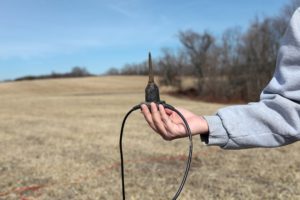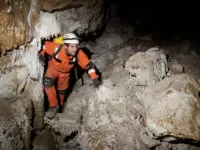
Geophysicists take readings and measurements of features and anomalies and finds at various elevations in order to create a 3D map for use by researchers and decision makers.
What Does a Geophysicist Do?
As excavation and other physical intervention is slow and costly (not to mention potentially damaging to historic or natural features), new technologies have arisen to allow researchers to see beneath the surface and map our world. One of those technologies is geophysics. This important technology is used in specializations as varied as archaeology and anthropology, seismology, construction, to certain types of engineer in fossil fuel or mineral prospecting and digital mapping. Today, the data and method has solid uses in environmental protection and engineering too. Each area has a different use of the data but the principles remain the same.
Geophysicists take readings of the surface of the Earth and beneath it from above ground. They look for anomalies and other changes in the underground configuration in order to build a picture of its resources or plan. This information may be used to inform archaeologists where to dig, construction engineers where to build or not to build and where underground facilities may be a hindrance to development (for example, underground rivers, electricity cables, water supplies etc.)
Not all geophysicists work in the field. Some work in labs and in offices, compiling and analyzing data or putting it into a report for decision makers. Either way, geophysicists need to be able to interpret the data that they produce.
Where Does a Geophysicist Work?
The majority of geophysicists work in architecture and engineering, particularly construction, landscape design and geoengineering. These industries work on the front line of civic engineering and land development. Typically, those employed here will work full time and move from project to project as there will nearly always be work for them to do. As discussed above, these organizations may employ fieldworkers and lab workers interpreting the data but sometimes they will be the same person - they appear on site, take their data and then return to the lab to compile it.
Many will also work in fossil fuel and mineral mining industries. Their skills and the technology is vital in finding new pockets of metals, minerals and fuels. It represents a faster, safer and cheaper method of prospecting than physical intervention and is better for the environment overall.
Thirdly, they may work as independent consultants or with scientific organizations that outsource their skills and knowledge on a contract basis. This style of contract work is a way of cutting costs for businesses while allowing the geophysicist to concentrate developing their skills. Finally, some may find work in Federal, local and state governments in such areas as environmental protection and land development, possibly for State Parks and National Parks.
Geophysics - Related Degrees
What Is the Average Geophysicist Salary?
As of May 2020, the median salary for geophysicists, which falls under the broader BLS category of physicists, was $128,950. The range of salaries across the country varies from $62,410 to $189,690. This is for specialists in geophysics, not people who have other titles but carry out geophysics as part of their role.*
As with most things, the higher salaries are for those with more experience and where there is most demand. Also, the more skills a person has, the higher they are likely to climb and the more likely they are to receive a higher salary. Geophysics requires not just knowledge of the system, but also interpretation, report writing and analysis, presentation skills and modelling.
Geophysics Jobs & Job Description
Information collected and studied by Geophysicists is used for several applications, such as determining characteristics of our natural resources and major infrastructure projects within civilization. The role of a Geophysicist will vary from job to job, but generally, the duties and requirements are:
- A Bachelor's degree in geophysics or geoscience related field of study
- Knowledge of geological and tectonic systems and their applications to real world scenarios
- Collect field samples and observations outdoors in varying environmental and weather conditions
- Data collected from the surface of the Earth and under the surface; survey and record all geophysical models and images
- Analyze field samples collected in the laboratory and maintain detailed logs of information
- Ability to derive technical reports from observations and information collected from the field
- Report and take direction from a manager; ability to follow job tasks accurately
- Ability to work independently or as a contributing member within a team
- Excellent written, oral and technical communication skills required to interact with a variety of individuals, such as clients, supervisors, and fellow scientists
As a Senior Geophysicist, the requirements and duties can be similar to an entry level Geophysicist with additional responsibilities. These additional responsibilities may be:
- A Master's degree or Ph.D. in geophysics, geology or related field of study
- Experience working in geophysics, using related technology and a strong knowledge of geophysical systems
- Design projects and schedules; ensure work is completed on schedule by teams of geophysicists
- Create budgets for projects and monitor project progress assessing any deviation from budget
- Travel required managing teams in the field and providing recommendations to methods and projects
- Oversee work from subcontractors that are subcontracted to perform certain job tasks
- Train fellow geophysicists in job specific details or new methods and develop new training initiatives
- Attend regular meetings to discuss project progress and project results
- Compile regular interval analyses of results and determine qualitative and quantitative trends or changes
- Provide consultation and scientific information to clients, governments and management; excellent communication and presentation skills required
- Develop and research new methods of surveying and interpreting geophysical data
What Is the Job Demand for Geophysicists?
The demand of skills of geophysicists is expected to experience a rise of 8% between 2020 and 2030.* Physical intervention is becoming less common for cost and safety reason, and environmental protection is required in case of discovery of something historically, culturally or environmentally sensitive. Therefore, those who use the skills of geophysicists find it a safe, fast, effective and cheap research method.
What Are the Education Requirements to Become a Geophysicist?
The research heavy and practical aspect of geophysical survey means that there are no specific undergraduate degrees in geophysics. Candidates must take a geoscience related degree such as geology, geography, environmental planning and anything else that examines landscapes and landscape features. At undergraduate level, environmental minors and electives are strongly recommended, geology especially if the candidate does not take a degree in this. There should also be a strong focus on IT skills and math.
A number of colleges and universities now have dedicated geophysics masters degrees and these should always be preferred where available. Where not available, the candidate should stick with their strengths in geology, geography etc. Again, they should also focus on IT, and on math and statistics as the primary skill set required for a career in geophysics. Some entry level jobs may be open to BA/BS graduates, but MA/MS will always be preferred. A candidate should only pursue a PhD if he or she wants a career in research and teaching.
What Kind Of Societies and Professional Organizations Do Geophysicists Have?
Geophysics is integral to many industries. As a result, the following professional bodies area available:
- International Union of Geodesy and Geophysics: This international NGO, known informally as IUGG, forges partnerships over borders in the study of our planet through the use of geophysics and other IT based technologies
- American Geophysical Union: The importance of geophysics to the study of our planet is the reason we have an organization dedicated purely to the use of such technologies. AGU is the largest and most important of its kind in the USA
- Society of Exploration Geophysicists: SEG is the largest global body dedicated to the promotion of applied geophysics (those who work in the field). Their “Geocientists Without Borders” provides practical application of technologies and methods to help the developing world
*2020 US Bureau of Labor Statistics salary figures and job growth projections for physicists and astronomers reflect national data not school-specific information. Conditions in your area may vary. Data accessed September 2021.





